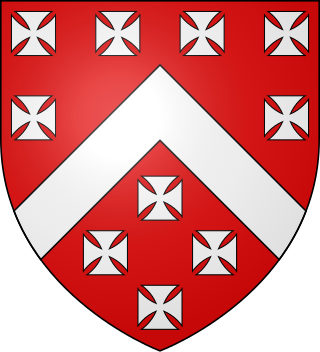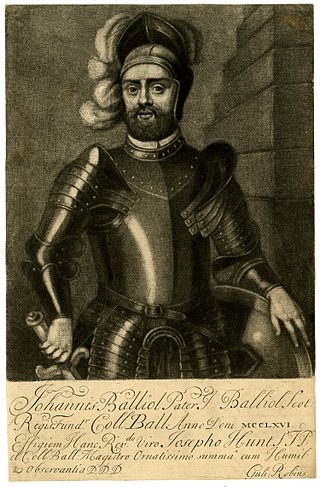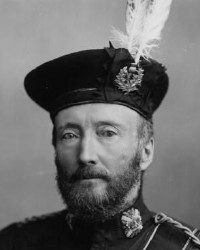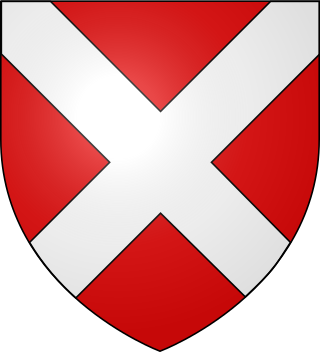
Henry de Bohun, 1st Earl of Hereford of Pleshey Castle in Essex, was an Anglo-Norman nobleman who became Hereditary Constable of England from 1199.

Reginald de Braose was one of the sons of William de Braose, 4th Lord of Bramber and Matilda, also known as Maud de St. Valery and Lady de la Haie. Her other children included William and Giles.

William de Berkeley, 1st Marquess of Berkeley was an English peer, given the epithet "The Waste-All" by the family biographer and steward John Smyth of Nibley. He was buried at "St. Augustine's Friars, London" according to one source, but most likely in the Berkeley family foundation of St Augustine's Abbey, Bristol.

John de Balliol was an English nobleman, belonging to the House of Balliol. Balliol College, in Oxford, is named after him.
Sir Robert de Ros was an English nobleman.
Richard de Clare, 3rd Earl of Hertford, feudal baron of Clare in Suffolk, and lord of Tonbridge in Kent and of Cardigan in Wales, was a powerful Anglo-Norman nobleman with vast landholdings in England and Wales.

Miles FitzWalter of Gloucester, 1st Earl of Hereford was a great magnate based in the west of England. He was hereditary Constable of England and Sheriff of Gloucestershire.

Nicholas Vaux, 1st Baron Vaux of Harrowden was a soldier and courtier in England and an early member of the House of Commons. He was the son of Lancastrian loyalists Sir William Vaux of Harrowden and Katherine Penyson, a lady of the household of Queen Margaret of Anjou, wife of the Lancastrian king, Henry VI of England. Katherine was a daughter of Gregorio Panizzone of Courticelle, in Piedmont, Italy which was at that time subject to King René of Anjou, father of Queen Margaret of Anjou, as ruler of Provence. He grew up during the years of Yorkist rule and later served under the founder of the Tudor dynasty, Henry VII.
Baldwin de Redvers, 1st Earl of Devon, feudal baron of Plympton in Devon, was the son of Richard de Redvers and his wife Adeline Peverel.

William Henry Walter Montagu Douglas Scott, 6th Duke of Buccleuch and 8th Duke of Queensberry, was a Scottish Member of Parliament and peer. He was the paternal grandfather of Princess Alice, Duchess of Gloucester, and the maternal great-grandfather of Prince William of Gloucester and Prince Richard, Duke of Gloucester.
Sir Anthony Browne was the son of Sir Thomas Browne and Eleanor FitzAlan. He served as standard-bearer to Henry VII, and Lieutenant of Calais.
Bertha of Hereford, also known as Bertha de Pitres, was the daughter of Miles de Gloucester, 1st Earl of Hereford, and a wealthy heiress, Sibyl de Neufmarché. She was the wife of William de Braose, 3rd Lord of Bramber to whom she brought many castles and Lordships, such as Brecknock, and Abergavenny.

Ranulph Neville, 1st Baron Neville of Raby Castle, County Durham, was an English nobleman and head of the powerful Neville family.

Thomas Brooke, 8th Baron Cobham, lord of the Manor of Cobham, Kent, was an English peer.

The Constable of Chester was a mediaeval hereditary office held by the Barons of Halton. The functions of the Constable are unclear, possibly they related to the custody of Chester Castle, as was the main function of most mediaeval constables, but Sanders (1960) says the office-holder was constable for the entire County Palatine.

Reginald FitzPiers, also known as Reynold FitzPiers, Lord of Blenlevenny was a 13th-century English nobleman and Sheriff of Hampshire. He was the second son of Peter FitzHerbert and Alice de Warkworth, and following the death of his brother inherited the minor Marcher Lordship of Blaenllynfi from him.
William de Ros, Lord of Helmsley, was an English noble. He was the eldest son of Robert de Ros and Isabella Mac William.
Reginald FitzReginald, also known as Reynold FitzReynold, Lord of Hinton Martell, was an English noble.
Peter FitzReginald, also known as Piers FitzReynold, Lord of Chewton was an English noble.
Matthew FitzHerbert, Lord of Erlestoke and Stokenham, was an English nobleman and Sheriff of Sussex. FitzHerbert was one of the Counsellors named in Magna Carta in 1215. He was the son of Herbert FitzHerbert and Lucy de Hereford. His elder brother was Peter FitzHerbert.











